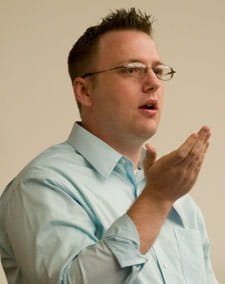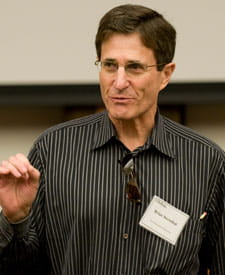Interdisciplinary Metacognition Conference brings together top scholars in mind science
9/24/2008 - University professors get paid to teach students to think for themselves. But some experts take it a step further and dedicate their research to think about thinking — a process known as metacognition that aims to shed light on ideas and learning.
 |
| Professor Derek Rucker |
| Photo © Rich Foreman |
 |
| Professor Brian Sternthal |
| Photo © Rich Foreman |
Some of those experts shared their insights during the Kellogg School’s inaugural Metacognition Conference, held Sept. 19 and 20 at the James L. Allen Center. The initiative, which was co-sponsored by the Kellogg Marketing Department and Northwestern University, convened leading scholars from Northwestern and around the country to speak before an audience of faculty and doctoral students.
The gathering was an opportunity for “intellectual exchange,” noted Derek Rucker, assistant professor of marketing and conference co-chair. “It’s a way to maintain and enhance the intellectual capital we value as a school and a university.” He also emphasized the value of including both marketing and psychology professors as a way of exploring metacognition — an area of formal study in cognitive theory that explores learning. “The interdisciplinary nature of the conference is inspired by, and follows from, the interdisciplinary research philosophy of Kellogg and Northwestern University as a whole,” Rucker said.
According to Rucker, metacognition emerged as the topic because of its significance in understanding human behaviors like decision making. “This has immediate implications in marketing for factors such as understanding consumers’ purchasing behavior, their willingness to pay for various items and their response to advertising and marketing efforts,” he said.
Leading off the conference’s first day was Brian Sternthal, Kraft Foods Chair in Marketing at Kellogg, who delivered opening remarks, welcoming attendees to what he hoped would become an annual event. The conference co-chair said that in planning the gathering, he and his colleagues sought to create an academic initiative that would be cutting edge and interdisciplinary, featuring top experts. Sternhal turned the podium over to Rucker, whom he recognized as a catalyst for the event, to introduce the speakers.
Norbert Schwarz, the Charles Horton Cooley Professor of Psychology at the University of Michigan, delivered the first presentation, titled, “Metacognitive Experiences: A Feelings-as-Information Perspective.”
“Over the last 10 years or so, I’ve been interested in what people learn from the dynamics of their own thoughts,” Schwarz said. He described the role and importance of feelings as an information source, for example, when people make choices or judgments. He pointed out variables that can impact feelings, such as the degree of fluency and ease of recall, and illustrated his points by sharing data that included the influence that font clarity has on the perceived difficulty of a task, such as following a recipe. The presentation ended with a lively question and answer session.
In another presentation, “To Trust or Not to Trust Our Feelings in Judgments and Decisions,” Michel Pham, Columbia University’s Kravis Professor of Business, discussed the process or conditions in which people trust input from their feelings when making decision. He explored the manipulation of such trust and described a series of experiments in which variations of a game were used to discover the influence of people’s trust in their feelings on decision making.
Later, Frank Kardes, the Donald E. Weston Professor of Marketing at the University of Cincinnati, presented his lecture, “Omission Detection, Discounting and Adjustment.” Northwestern’s Galen Bodenhausen, the Lawyer Taylor Professor of Psychology and Marketing, followed with a discussion titled, “Which Inferences are Invited by Ease-of-Retrieval Experiences? Evidence from Implicit Measures and Individual Differences.” The final lecture of the conference’s opening day came from Kellogg Associate Professor of Marketing Miguel Brendl who presented “When Negative Valence Reverses Regulatory Focus: Accessibility of Metacognition?”
Rucker began the conference’s Saturday sessions with his lecture, “The Psychology of Conviction: The Certainty Appraisals Model.” Among the other topics addressed by conference speakers were issues related to self-validation and persuasion and goals and metagoals.
The conference closed with John Lynch, the Roy J. Bostock Professor at Duke University, as discussant.
Rucker emphasized the significance of metacognition as an area of study because of its “pivotal role in a wide variety of human behaviors,” including making decisions that influence behavior and bias. Research in this field, he added, has broader implications for understanding stereotyping and prejudice, as well as the foundations of human reasoning.






